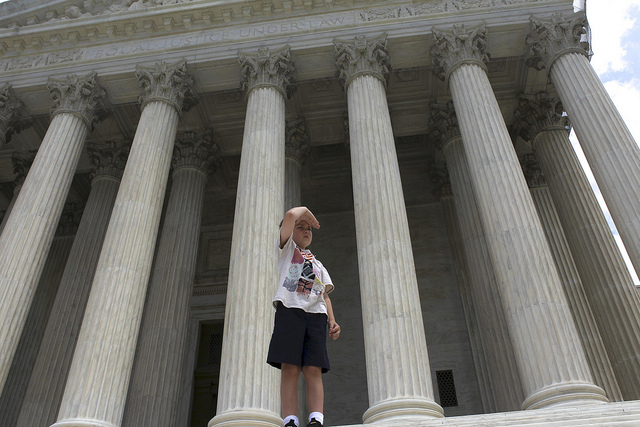
The Supreme Court of the United States in Washington, D.C.
Christopher Elliott / Flickr


The Supreme Court of the United States in Washington, D.C.
Christopher Elliott / Flickr
The U.S. Supreme Court on Tuesday agreed to review six petitions relating to the federal government’s regulation of greenhouse gasses.
But the high court consolidated the cases, and will only review a single question that pertains to all of them.
SCOTUSBlog’s Lyle Denniston reports:
The granted issue is: “Whether EPA permissibly determined that its regulation of greenhouse gas emissions from new motor vehicles triggered permitting requirements under the Clean Air Act for stationary sources that emit greenhouse gases.”
Basically: Do the EPA’s vehicle emission standards mean the federal agency has to require pre-construction permits to limit emissions from stationary sites like power plants?
This Supreme Court argument is important to Oklahoma.
State electrical utilities, like Oklahoma Gas and Electric, have a direct stake, because it centers on federal regulation of their industry. Energy company executives will be watching the case because it concerns fossil fuels.
And Oklahoma politicians and policymakers, like Attorney General Scott Pruitt, are hoping the Supreme Court will yank the EPA’s leash and back off what they see as a “war against fossil fuels,” and a federal intrusion into state environmental authority.
In a statement, AG Pruitt praised the SCOTUS for agreeing to hear the argument against the EPA’s “onerous greenhouse gas regulations:”
“… Congress clearly intended for the states to have primacy in this area and for the EPA to work closely with the states to regulate these issues,” General Pruitt wrote. “However, the EPA is attempting to usurp the role of the states all in the name of imposing this administration’s anti-fossil fuels agenda.”
The arguments before the Supreme Court are narrow, and the high court rejected other cases that posed broader challenges to the EPA’s authority to regulate carbon emissions, which the Obama administration and environmentalists said bolstered their argument, Politico’s Erica Martinson reports:
But greens breathed a sigh of relief, saying the narrow scope of the court’s announcement makes it unlikely that the case will jeopardize the EPA’s attempts to limit carbon emissions from power plants, the nation’s biggest greenhouse gas source.
…
Environmental Defense Fund attorney Vickie Patton said the court’s narrow selection of both the cases and the question makes “it abundantly clear, once and for all, that EPA has the both legal authority and the responsibility to address climate change and the carbon pollution that causes it.”